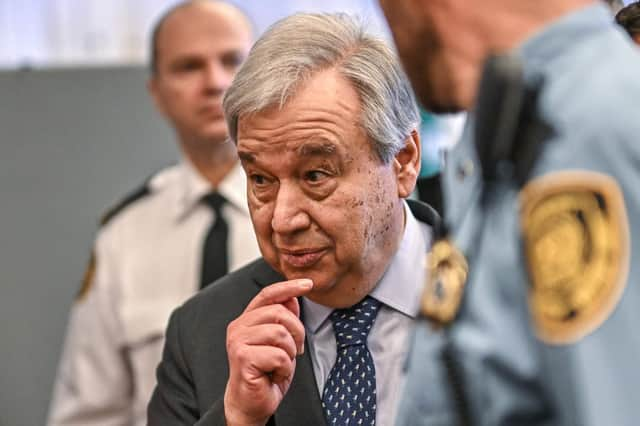Environment: The climate time bomb is ticking


Greta Thunberg commented “Today, after yesterday's IPCC report, everything is back to normal – as always. We continue to ignore the climate crisis as if nothing happened. Our societies are still in denial, and those in power go on with their never-ending quests to maximise profits. We cannot afford this.”
So what did the report actually say? Prof. Katharine Hayhoe wrote an excellent summary on Twitter.
Advertisement
Hide AdAdvertisement
Hide Ad“First, climate change has already caused widespread and substantial losses to almost every aspect of human life on this planet, and the impacts on future generations depend on the choices we make NOW.
Second, every bit of warming matters. The warmer the planet gets, the more widespread and pronounced the changes in both average climate and climate and weather extremes become.
Third, the impacts are very serious: they directly affect our health, food sources, water and more.
Fourth, the percentage of animal species exposed to potentially dangerous conditions increases significantly the faster the world warms. In general, ocean species like coral and tropical species are most at risk.
Advertisement
Hide AdAdvertisement
Hide AdSo given this dire news, surely we are well on our way to cutting our carbon emissions, no? No. The synthesis report is crystal clear: we are not doing nearly enough to avoid dangerous impacts, let alone achieve the targets of the Paris Agreement.”
The report shows our choices matter and the faster we act, the better off we will all be - all of us who call this planet home. So many of the solutions are already available today, and benefit us in so many ways -- addressing health, equity, justice, and even economic concerns while increasing resilience and accelerating the transition to a clean energy future.
The report was launched with a speech from the United Nations Secretary-General. António Guterres. He began
“Dear friends humanity is on thin ice and that ice is melting fast as today's report of the Intergovernmental Panel on Climate Change details. Humans are responsible for virtually all Global heating. Over the last 200 years, the rate of temperature rise in the last half-century is the highest in 2000 years. Concentrations of carbon dioxide are at their highest in at least 2 million years. The climate time bomb is ticking but today's IPCC report is a how-to guide to diffuse the climate time bomb. It is a survival guide for humanity as it shows the 1.5-degree limit is achievable but it will take a quantum leap in climate action. This report is a clarion call to massively fast-track climate efforts by every country and every sector and in every time frame. In short, our world needs climate action on all fronts everything, everywhere all at once.”
Advertisement
Hide AdAdvertisement
Hide AdOn hearing the speech, Geoff Cox, Chair of South Yorkshire Climate Alliance said “I feel sorry for the Secretary-General, he must be running out of words to describe his despair. It's interesting to reflect that climate scientists have been warning of irreversible climate consequences for years – to prompt action, and now feel the need to emphasise the remaining scope for hope – to ensure we don’t all just give up”.
Climate scientist, Prof Bill McGuire tweeted “I'm sorry, but the 'final warning' was years back It is now practically impossible to stop a 1.5C rise, so we cannot sidestep dangerous climate breakdown But we must fight for every 0.1C rise to stop dangerous becoming cataclysmic.” He calculates that we need to slash emissions by 50 per cent in about 80 months to have any hope of remaining within the 1.5 degrees of heating.
Author Jason Hickel called for a Fossil Fuel Non-Proliferation Treaty, which now has strong support from scientists and civil society. We need a clear and binding plan for phasing out fossil fuels in a just and equitable way. Meanwhile, our Government continue to go ahead with the Cumbria coal mine, Rosebank oil field, and block onshore wind and solar.
We need to understand that the IPCC is a very conservative body. Everything that they publish has to achieve the consensus of a very large group of international scientists. This explains why there is hardly any mention of the risks associated with feedback loops and weakening carbon sinks as they are so difficult to model. These feedback loops are already kicking in at our current 1.1 degrees C of heating but will accelerate as the planet heats up further. This could lead to a Hothouse Earth scenario where the planet continues to heat up, changing our living planet to a desolate one like Mars.
Advertisement
Hide AdAdvertisement
Hide AdThe media have largely ignored the urgent calls in the report for the net zero targets to be brought forward to 2035. They have also failed to inform us of the mega bill that we are passing on to our youth. It is they who will have to pay for the carbon capture and storage that will be needed in the future because our generation has failed to stop our addiction to fossil fuels.